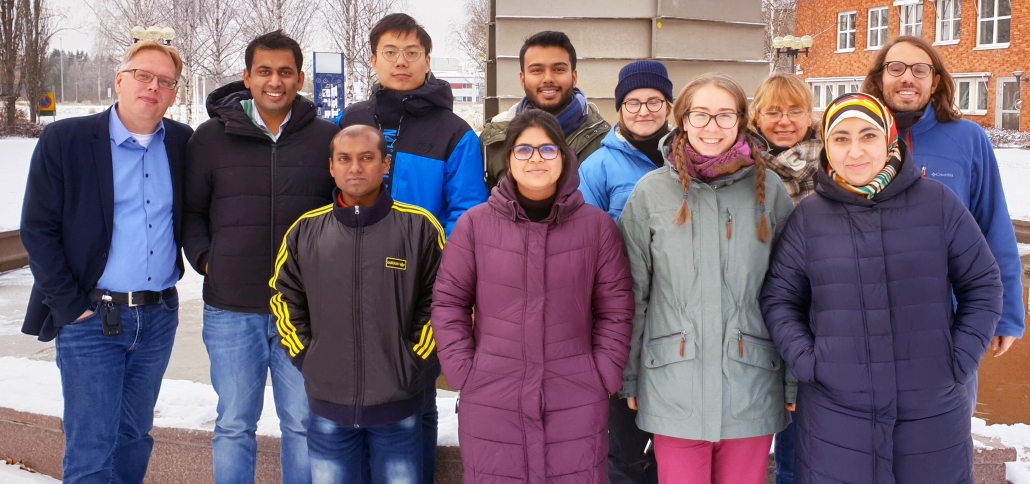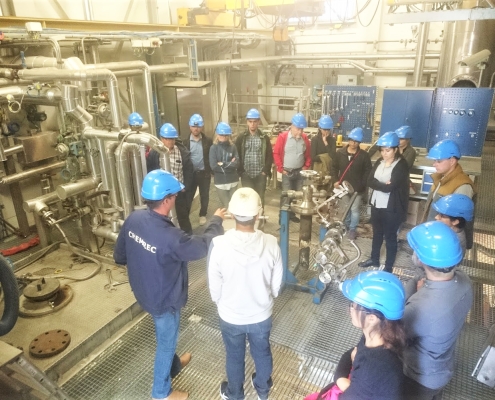Graduate School
The Bio4Energy Graduate School provides PhD students and postdoctoral fellows with knowledge, skills and tools to contribute to the transition and development of the biorefinery industry.
It is open both to students in the Bio4Energy research environment and to students elsewhere, as long as they are at an advanced level and affiliated with a university.
Professionals in the sector interested in bioenergy and biorefinery innovation and development are equally encouraged to apply.
Thanks to the Graduate School, PhD students and early career researchers with diverse backgrounds in Chemistry, Biology, Physics, Economics, Energy Engineering or Systems Analysis develop a contact network by meeting senior researchers, technicians and developers; on location at the industrial development sites; as well as each other.
There are three generic courses that mirror the research environment itself. This has fundamental and applied research, as well as education and training, reflecting the stages of the biorefinery value chain.
RISE Research Institutes of Sweden, partners in Bio4Energy, contribute time and access to their facilities in Örnsköldsvik and Piteå.
Contact: Dimitris Athanassiadis, Dimitris.Athanassiadis@slu.se
Historical, Technological and Societal Background
Historical, technological and societal background to forestry and forest-based biorefining in Nordic countries
Extent and credits: 4.5 ECTS
Course coordinator: Carmen Cristescu
This is a general introduction to the development of biorefineries based on woody biomass. It gives the historical, technological and societal background to forest-based biorefining in the Nordic countries, in a sustainable development perspective.
- Assessment of forest biomass supply chains for biorefining;
- Historical aspects of forestry, forest-industrial processes and biorefineries based on woody biomass;
- Development of conversion processes for forest biomass (mechanical, chemical, thermal and biochemical) and;
- Environmental impacts and sustainability aspects.
Objectives
After the course, the student will be able to:
- Critically reflect on past and current challenges of using forest biomass;
- Understand the scientific background and environment of the forest industrial and biorefinery sectors;
- Reflect on the ecological, economic, societal and ethical issues associated with biorefining based on woody biomass;
- Discuss sustainability issues connected with the use of forest biomass in biorefineries and with technology development in the forest-industrial sector and;
- Elaborate on the concept of bioeconomy and effects of national and European environmental laws and regulations on the forest industrial and biorefinery sectors.
Application and prerequisites
For details, please go to the course page at the host organisation Swedish University of Agricultural Sciences.
This course is recommended for students with an interest in biorefinery at the PhD or postdoctoral level, as well as institute or industry representatives who wish to learn about the history of biorefinery based on woody biomass in the Nordic countries.
For enquiries regarding the course content, contact Carmen Cristescu.
Biorefinery Pilot Research
Extent and credits: 5 ECTS
Course coordinator: Francesco Gentili
Dates: 2 September – 14 October 2024
New for April 2024: Course Brochure Biorefinery Pilot Research
New for December 2023! Preview Edition of 2024
Objectives
On completion of the course, students will:
- Be able to describe the biorefinery technologies represented in pilot scale facilities within the Bio4Energy infrastructure and know how to get access to them;
- Be able to explain and discuss models for the roles of academia and functions of technical innovation systems and to critically evaluate real research facility cases based on these models;
- Beware of essentials regarding sampling, building of large-scale experimental equipment, fund raising, and intellectual property rights and;
- Have gained access to interdisciplinary exchange of knowledge and ideas through networking activities.
Contents
The course consists of:
- On-site demonstration of equipment and technology, lectures and laboratory work;
- Lectures on essential subjects for large-scale biorefinery or bioenergy research and;
- A project assignment, typically a case study of a technical innovation system at one of the pilot plants in the cluster.
Application and prerequisites
The application for enrolment in the next edition of Biorefinery Pilot Research will open in 2024. We will be posting a link to the registration form, here.
This course is recommended for students with an interest in biorefinery at the PhD or postdoctoral level, as well as industry representatives who wish to learn about research and innovation as carried out at the biorefinery-related pilot and demonstration units lining the east coast of Northern Sweden.
For enquiries regarding the course content, contact Francesco Gentili.
Course Brochure
Biorefinery Pilot Research 2024
Systems’ Perspectives on Biomass Resources
Extent and credits: 7.5 ECTS
Course coordinator: Elisabeth Wetterlund
Dates: 11 – 15 November 2024 — onsite at Luleå University of Technology, Luleå, Sweden; followed by distance learning until March 2025
Edition 2024 is here!
Objectives
On completion of the course, students will:
- Be able to understand how to apply a systems’ perspective on their own research;
- Have gained insights into the current global energy and environmental challenges;
- Have gained insights into the rational of sustainability;
- Have awareness of tools and methods used for environmental, technical and economic systems analysis.
Contents
The course consists of:
- Lectures on sustainability issues, systems analysis approaches and tools, as well as workshops;
- Lectures on essential subjects for large-scale biorefinery or bioenergy research and;
- A project assignment, where the students identify suitable systems analysis tools or methods to be applied to their own research. The outcome will be a draft research proposal, a journal or conference manuscript or a chapter of a thesis.
Application and prerequisites
For enquiries regarding the course content, contact Elisabeth Wetterlund.

Students and coordinator Robert Lundmark, of the 2019 edition of Systems’ Perspectives on Biomass Resources. Photographed at Luleå University of Technology (LTU), Sweden. Photo by courtesy of LTU.
Course Brochure
Course page on the website of Luleå University of Technology
- Schedule of Study for Edition 2024
- SPBR Info Sheet – New for September 2024







